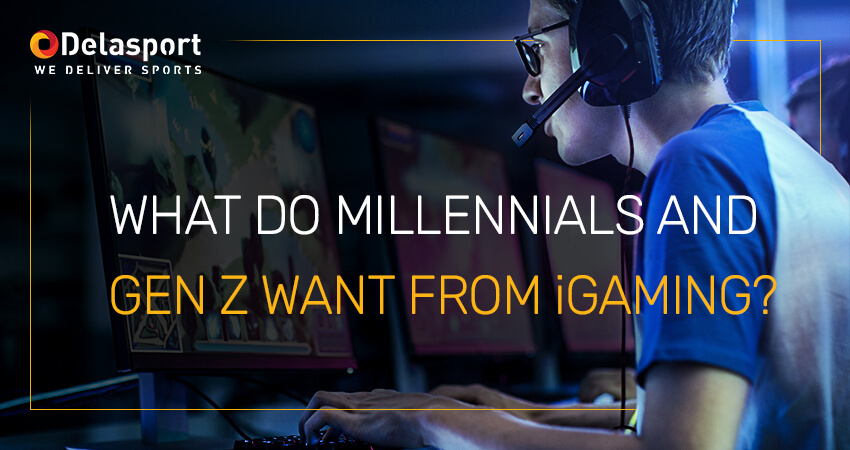
Crafting the best experiences for different demographics is always a challenge, especially in a fast-moving digital world where technological paradigms are shifting with unprecedented frequency. Having lived through the digital revolution, Millennials and Gen Z players are a demographic that is notoriously difficult to cater for because their expectations are very particular. For them, weak branding, clumsy experiences, and word of mouth can be powerful influencers, and if something fails to deliver on a promise it won’t take long for the rest of the group to know about it.
The iGaming space is just one of many industries which have needed to keep pace with new challenges and opportunities that the millennial market brings. But what are Millennials looking for from their online operators, and how can companies make sure that they deliver on such complex expectations?
Coming up:
Who are Millennials and Gen Z?
What do Millennials and Gen Z want from their iGaming?
Better gamification
Better mobile experiences
Better digital security
Short-form and micro-content
More Esports
Who are Millennials and Gen Z?
As defined by the Pew Research Center, Millennials are born between 1981 and 2006, and anyone born since 1997 can be considered as part of the so-called ‘Generation Z’. Today, Millennials are mostly in their adulthood years with families and careers yet are considered as the generation who saw the rise of the Internet and smartphone.
Millennials and Gen Z players have developed a unique perspective because of their experiences in both online and offline environments. And, unlike previous generations, they are not particularly keen on land-based casinos which means that operators must provide superior experiences for other touchpoints, especially digital.
What do Millennials and Gen Z want from their iGaming?
Internet gambling has sharply risen in popularity over the last decade, fueled in part by the ongoing epidemic in recent years. And, because casino games are now available to be played on both mobile and desktop casino platforms, accessibility has never been easier or more convenient. Here are some things for operators to consider when it comes to giving Millennials and Gen Z-ers what they want:
Better gamification
Because Millennials and Gen Z audiences have grown up playing video games, operators must develop experiences that share characteristics with video games to stay current and competitive. The iGaming gamification should provide better graphics, deeper gameplay loops, and threshold features such as missions, badges, and achievements that will go a long way to bridge the gap between recreation and online gambling.
Better mobile experiences
To earn the attention of Millennials and Gen Z consumers, operators have had to invest in holistic responsive design and customization of their products. This extends to ensuring that the gamification aspects of the experience remain intact and seamless across laptops, mobiles, and tablets, with resolution and graphics quality to match the horsepower that these devices can afford. For Millennials, having the mobility to access their games wherever they are is often a dealbreaker.
Better digital security
Today, digital security is a given, but for Millennials and Gen Z players, it can be a real sticking point. Growing up with the Internet and proliferation of data collection and exploitation, they will be more sensitive than ever as to how their information is used and stored. This also extends to payment methods with better confidentiality and security of transactions. As such, more and more casinos are starting to look at how they can adopt cryptocurrency payments into their offering as they are considered more secure and confidential than credit cards and bank accounts.
Short-form and micro-content
Casinos are competing for players’ attention, time, and spending power with many other forms of entertainment. Millennials and Gen Z audiences have short attention spans and are often multi-screening and streaming content while they handle other tasks at the same time. By creating iGaming platforms to deliver short-form and fast-access content streams, operators can ensure that they provide the kind of experience that today’s players are looking for. The ongoing pandemic has only accelerated this behavior with even higher proliferation of streaming content to the point where it’s not unusual for someone to stream games while playing other games, dipping in and out of highlights, making bets, and discussing it all in real-time over social media.
More Esports
Esports is one of the verticals with the most potential and interest for Millennials and Gen Z players. For them, video games have been a large part of their recreational lives with the ongoing generational leaps in PC and console gaming. The worldwide Esports industry was valued at just over 1.08 billion in 2021 (up about 50% from the previous year) and is expected to continue to expand in tandem with technical and societal advancements. To ensure that the millennial and Gen Z market has as much choice as possible when it comes to how they bet, operators must create more space and infrastructure for Esports to have the same experiences as mature online sports betting.
*If you want to learn more read about the History and Evolution of Esports.
How Delasport is helping operators cater to younger players
As one of the leaders in iGaming software technology, Delasport has long been aware of the importance of the millennial and Gen Z market, and we have made sure that our products and services keep this demographic in mind.
Our Esports offering is one of the best in the market, and the casino games (such as Jetx) often have high-quality graphics and strong connections with traditional video games. This connection is augmented by our extensive gamification, offering Esports and Sports bettors engaging experiences that include missions, tournaments, achievements, points, and much more.
If you’re looking to advance your millennial offering, get in touch with our team and we’ll help to get your operation in front of the right audiences.


